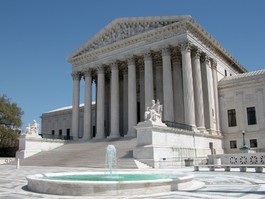11/7 UPDATE: The Supreme Court will hear oral arguments on this case on November 12th.
Several amicus briefs have been filed on this case if you wish to read further on the issue.
Several amicus briefs have been filed on this case if you wish to read further on the issue.
5/18 UPDATE: The Supreme Court ruled today in favor of the taxpayers. The ruling was 5-4 with Chief Justice Roberts and Justices Alito, Kennedy, Breyer and Sotomayor ruling for the Wynne taxpayers and Justices Scalia, Thomas, Ginsburg and Kagan dissenting. This ruling could lead to large refund opportunities for professional athletes as detailed in the original story below.
11/12 UPDATE: The transcript from the oral arguments before the Supreme Court is now available.

ORIGINAL STORY: In May, the Supreme Court agreed to hear a state tax case that could change the entire landscape of taxation for professional athletes and save professional athletes millions in state and local income taxes.
Beginning with the next Supreme Court term in October, the Court will hear arguments over the case Comptroller of the Treasury of Maryland v. Wynne to determine if a state taxing their resident’s income that was earned outside of that state violates the Commerce Clause of the Constitution.
A bit of background on the case.
Beginning with the next Supreme Court term in October, the Court will hear arguments over the case Comptroller of the Treasury of Maryland v. Wynne to determine if a state taxing their resident’s income that was earned outside of that state violates the Commerce Clause of the Constitution.
A bit of background on the case.
How this applies to professional athletes and the “jock tax”.
Maryland is no different than all other states that have local income taxes. Every state that has state and local income taxes refund taxpayers for income taxes paid to other states, but not for income taxes paid to other local (city and county) governments. The state’s reasoning behind this is the state doesn’t get that tax revenue – the local government does – so the local government should decide if they are going to credit the taxpayer for the taxes paid to other states.
Like all other taxpayers, professional athletes pay state and local taxes in the jurisdictions where they earn their income. For professional athletes, they are deemed to earn their income at all the places they play their games. You can read here for more on this concept but this means professional athletes pay income taxes in all of those locations as well. If these athletes are a resident of a state that also has an income tax, they are given a credit (subject to some restrictions) for taxes paid to other states. However, when it comes to local income taxes, they generally are not given any credit by their resident state for taxes paid to nonresident local governments.*
Between the five major sports leagues (MLB, MLS, NBA, NFL, NHL) there are 16 jurisdictions that have a local income tax. Some of these taxes are imposed on the employer and not the athletes but this Supreme Court decision would likely affect both. Those local governments with a local income tax and a professional sports team are San Francisco, CA; Denver, CO; Indianapolis, IN; Baltimore, MD; Landover, MD; Detroit, MI; Kansas City, MO; St. Louis, MO; Newark, NJ; New York City, NY; Cincinnati, OH; Cleveland, OH; Columbus, OH; Chester, PA; Philadelphia, PA; and Pittsburgh, PA. These 16 jurisdictions host 40 professional sports teams.
If the Supreme Court were to rule in favor of Mr. Wynn, professional athletes who are residents of any of these 16 jurisdictions could see a large decrease in their tax bills.
Maryland is no different than all other states that have local income taxes. Every state that has state and local income taxes refund taxpayers for income taxes paid to other states, but not for income taxes paid to other local (city and county) governments. The state’s reasoning behind this is the state doesn’t get that tax revenue – the local government does – so the local government should decide if they are going to credit the taxpayer for the taxes paid to other states.
Like all other taxpayers, professional athletes pay state and local taxes in the jurisdictions where they earn their income. For professional athletes, they are deemed to earn their income at all the places they play their games. You can read here for more on this concept but this means professional athletes pay income taxes in all of those locations as well. If these athletes are a resident of a state that also has an income tax, they are given a credit (subject to some restrictions) for taxes paid to other states. However, when it comes to local income taxes, they generally are not given any credit by their resident state for taxes paid to nonresident local governments.*
Between the five major sports leagues (MLB, MLS, NBA, NFL, NHL) there are 16 jurisdictions that have a local income tax. Some of these taxes are imposed on the employer and not the athletes but this Supreme Court decision would likely affect both. Those local governments with a local income tax and a professional sports team are San Francisco, CA; Denver, CO; Indianapolis, IN; Baltimore, MD; Landover, MD; Detroit, MI; Kansas City, MO; St. Louis, MO; Newark, NJ; New York City, NY; Cincinnati, OH; Cleveland, OH; Columbus, OH; Chester, PA; Philadelphia, PA; and Pittsburgh, PA. These 16 jurisdictions host 40 professional sports teams.
If the Supreme Court were to rule in favor of Mr. Wynn, professional athletes who are residents of any of these 16 jurisdictions could see a large decrease in their tax bills.
Brian Wynne is a business owner in Maryland who owns Maxim Healthcare Services – an S Corporation – that operates in several states. The income earned by an S Corporation “flows through” to the corporation’s owner’s personal tax liability. Because this corporation operates in more than just Maryland, the corporation (and subsequently Mr. Wynne) owed taxes in not just Maryland but the other states his company did business. Maryland – like all other states with an income tax – gives their residents a tax credit for income taxes paid to other states. However, this credit only applies to state income taxes and not local income taxes. Mr. Wynne challenged the notion that he should have to pay local income tax for income earned in other states. Mr. Wynne claims the local taxation of income earned in other states violates the Commerce Clause of the Constitution.
While we could spend much more time and detail discussing this legal argument, typically, when one argues that a tax violates the Commerce Clause of the Constitution they mean this tax unfairly burdens interstate commerce (business done in more than just one state) when compared to the burden on intrastate commerce (business done in only that state). Mr. Wynn’s legal team argues that because Mr. Wynn does not get a credit for local taxes paid on income earned in another state, he bears a bigger tax burden on income earned in foreign jurisdictions than a Maryland resident would owe on that same amount of income if it were earned solely in Maryland. Mr. Wynn further claims that because this burden is greater on non-Maryland income this law violates the Commerce Clause and is unconstitutional. Mr. Wynn argued this to the Tax Court (Maryland won) and then appealed to the Maryland Court of Special Appeals (Wynn won) and then Maryland appealed to the highest Maryland court – the Court of Appeals – (Wynn won again) and now Maryland has appealed this case to the Supreme Court.
While we could spend much more time and detail discussing this legal argument, typically, when one argues that a tax violates the Commerce Clause of the Constitution they mean this tax unfairly burdens interstate commerce (business done in more than just one state) when compared to the burden on intrastate commerce (business done in only that state). Mr. Wynn’s legal team argues that because Mr. Wynn does not get a credit for local taxes paid on income earned in another state, he bears a bigger tax burden on income earned in foreign jurisdictions than a Maryland resident would owe on that same amount of income if it were earned solely in Maryland. Mr. Wynn further claims that because this burden is greater on non-Maryland income this law violates the Commerce Clause and is unconstitutional. Mr. Wynn argued this to the Tax Court (Maryland won) and then appealed to the Maryland Court of Special Appeals (Wynn won) and then Maryland appealed to the highest Maryland court – the Court of Appeals – (Wynn won again) and now Maryland has appealed this case to the Supreme Court.

For example, let’s assume Philadelphia Phillies 1B Ryan Howard is a resident of Philadelphia, PA. This means his 2014 salary is taxable income by both the city of Philadelphia and the state of Pennsylvania. Philadelphia taxes 3.924% of any of its resident’s income and Pennsylvania taxes 3.07% of any of its resident’s income.
Currently, when Ryan Howard plays in states outside of Pennsylvania he is only allowed a credit for the 3.07% of Pennsylvania taxes he would owe on that income earned in another state. However, if the Supreme Court ruled in Mr. Wynn’s favor, Ryan Howard would now be able to get a credit for up to 6.99% of any income taxes paid outside of Pennsylvania.
This increase in the state tax credit Ryan Howard would now be able to receive would save him over $275,000 this year alone in state and local taxes.
Perhaps Mr. Howard can send that $275,000 he will save this year, to Mr. Wynn to help cover his attorney fees.
Currently, when Ryan Howard plays in states outside of Pennsylvania he is only allowed a credit for the 3.07% of Pennsylvania taxes he would owe on that income earned in another state. However, if the Supreme Court ruled in Mr. Wynn’s favor, Ryan Howard would now be able to get a credit for up to 6.99% of any income taxes paid outside of Pennsylvania.
This increase in the state tax credit Ryan Howard would now be able to receive would save him over $275,000 this year alone in state and local taxes.
Perhaps Mr. Howard can send that $275,000 he will save this year, to Mr. Wynn to help cover his attorney fees.
Sign up to receive an email when TaxaBall has a new post, follow TaxaBall on twitter or like TaxaBall on Facebook.
 RSS Feed
RSS Feed